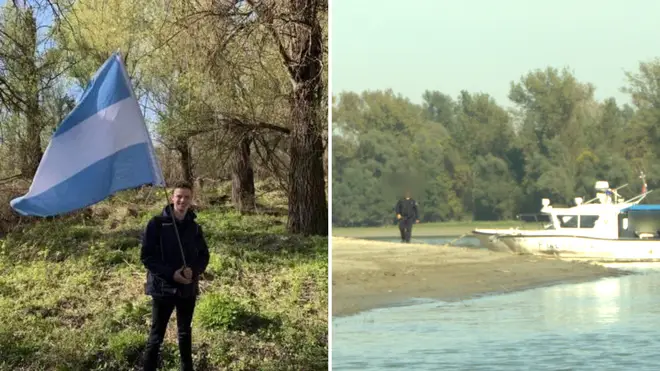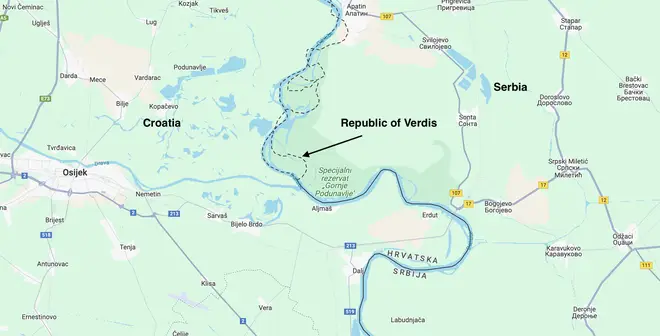
Oli Dugmore 4am - 7am
25 November 2023, 10:56

Most 14-year-old boys tend to be interested in video games, football and finishing their homework - but Daniel Jackson decided he wanted to found his own country instead.
Along with some like-minded people he encountered online, Jackson identified a small strip of unclaimed land between Croatia and Serbia, and so the Republic of Verdis was born in 2019.
“A group of people and I wanted to make something a bit different in the world,” he said.
Why not just set up a charity? “There are plenty of humanitarian organisations, and we wanted to take things to the next level.”

Jackson, who was born in Australia to British parents, dropped out of school during the Covid-19 pandemic and moved to the UK. After finding the plot of land, he and his friends declared the existence of the new microstate. Jackson was made interim president.
“We want to be a neutral state, a humanitarian hub,” he said. Verdis, taken from the word for ‘green’ in Latin, reflects the country’s respect for the environment, Jackson added.
Read more: 'Girl, 12, among six killed' after 6.4 magnitude earthquake rocks Croatia
Read more: British mum struck by lightning in Croatia is in a coma and will be airlifted to UK

He and his fellow government officials eventually want to establish the country as a secular version of the Vatican - with “humanitarian missions” to other countries. They have already been to Ukraine several times.
Funding has come from NGOs and several individual donors, although Jackson declined to go into further detail. Money has also come in from citizenship applications, which cost $16, as well as a fundraiser.
Verdis has had about 15,000 applications for citizenship so far, but they have only accepted about 350.
“We have strict criteria for who we let in, we’ve got a small land size, so we will take people with the skills that are in demand,” Jackson said.
The most important skills are knowledge of international law, and off-grid living, he added.
The 128-acre site, on the banks of the Danube, is split between a northern, forested, elevated section in the north, and a more marshy section in the south.
Jackson said that both Croatia and Serbia claim larger areas of the area around the River Danube, leaving this particular pocket unclaimed.
Although Verdis was proclaimed in 2019, the settlers only tried to set up their first permanent settlement on the 128-acre site last month. At this point, Croatian police swooped in, arrested them and told them to leave the country or they would be deported.
But Jackson is not deterred by this setback and is planning a legal battle to secure the rights to the land. He said that Croatia and Serbia’s own maps show that neither side has claimed the land that Verdis is on.
The Verdis national website describes the country's first national crisis: “The Croatian authorities forced the settlers to board a boat, asserting that they were not under arrest, while simultaneously preventing them from walking anywhere. In this process, the settlers’ documents and mobile phones were confiscated and settlers were not allowed to record.
“They were held at a police station located near the Hungarian border for several hours without the freedom to depart. The authorities informed the settlers that they must leave Croatia within seven days for a period of three months, or they would face forced removal.”
The Croatian government did not respond to a request for comment.
Jackson, who lives in Dover, hasn’t had any contact from the British Foreign Office, but Verdis does have some international recognition: Eswatini, a country in southern Africa, recognised the country’s passports earlier this year.
The region in which he has decided to settle is well-known for bloody wars over territorial disputes as Yugoslavia broke up in the 1990s. Did Jackson never consider that he and his compatriots might be settling somewhere they weren’t wanted?
“No, we’ve had good relations with local people [outside the territory], we’ve always maintained a good relationship,” he said. “We have only faced negativity from the authorities.”
Verdis is not far from Liberland, another microstate in the region. But although Verdis has good relations with Liberland, Jackson said, he distanced himself from its focus on cryptocurrency.
As well as Verdis’ humanitarian ideals, Jackson said he wanted it to be a model for new government systems. “We’re taking a look at direct democracy, instead of semi-direct,” he said. “The problem is it’s very easy to corrupt, but we’re taking a look at making it more feasible.”
But Verdis should not be mistaken for a utopian free-for-all. Jackson added that the country would have to set up its own police force and justice system, as well as maintaining strict border control. “Standards are always upheld in this regard,” he said.
“No country is visa-free, and we have to be really careful who we are letting in. There’s a whole process online. We have background checks, just because of safety. We don’t have the resources to keep track of people easily otherwise.”